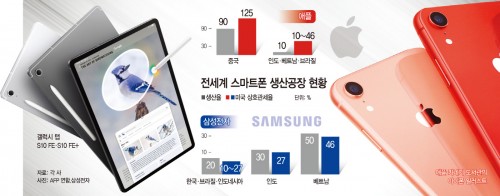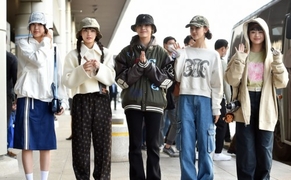 |
The Trump administration has decided to exempt 20 items, including smartphones and computers, from its reciprocal tariff regime, offering temporary relief to global electronics makers just 10 days after announcing sweeping tariff rates by country on April 2.
According to the electronics industry on April 13, the U.S. Customs and Border Protection (CBP) issued a notice on April 11 detailing which products would be excluded. Under the new directive, smartphones, computers, monitors, PC parts, hard disk drives, memory chips, integrated circuits (ICs), and semiconductor manufacturing equipment are exempt from the previously announced 125% tariffs on Chinese goods and 10% tariffs on imports from other countries.
However, the exemption does not apply to televisions and home appliances, leaving those sectors exposed. Semiconductors, while temporarily included in the exemption list, remain subject to further tariff review, signaling continued uncertainty.
Industry insiders believe the decision was largely aimed at protecting Apple. Without the exemption, the price of iPhones — most of which are produced in China — would have more than doubled, causing backlash from U.S. consumers. Tech outlet CNET previously reported that full tariffs on Chinese goods could result in significant price hikes even for lower-tier iPhone models.
South Korean companies are also expected to benefit. Samsung Electronics, which manufactures about half of its smartphones in Vietnam, was facing a 46% tariff — now avoided. The company will also see relief for products like Galaxy Books, SSDs, external storage devices, memory chips (DRAM and NAND), ICs, system semiconductors, telecom equipment, smartphone components, 5G base stations and modules, computer monitors, and LED displays.
LG Electronics is similarly expected to benefit from reduced tariffs on products like its LG Gram laptops and monitors. Meanwhile, parts suppliers LG Display and LG Innotek — both of which rely heavily on Apple contracts — are projected to gain. LG Innotek, which earns over 80% of its revenue from Apple, supplies camera modules for iPhones. LG Display provides screens for iPhones, iPads, and Apple Watches.
Despite these short-term gains, the exclusion of TVs, refrigerators, and washing machines from the exemption list is considered a setback for South Korean electronics firms. Samsung and LG currently manufacture TVs for North American markets in Mexico and produce appliances in both Mexico and the U.S. Depending on future tariff decisions, both companies are expected to review and possibly restructure their production lines.
Though memory chips are currently exempt, the decision isn’t final. President Donald Trump stated, “I will give you an answer on that on Monday (April 14). It will be very specific,” hinting that further changes may be coming.
Experts warn that the ever-shifting nature of U.S. tariff policy poses a risk. Kang Geum-yoon, a senior researcher at the Korea International Trade Association, noted, “Given the high likelihood of additional measures like export controls or reviews of existing trade agreements, companies must pay close attention to effective dates and exemption clauses to avoid operational setbacks.”
Most Read
-
1
-
2
-
3
-
4
-
5
-
6
-
7





















